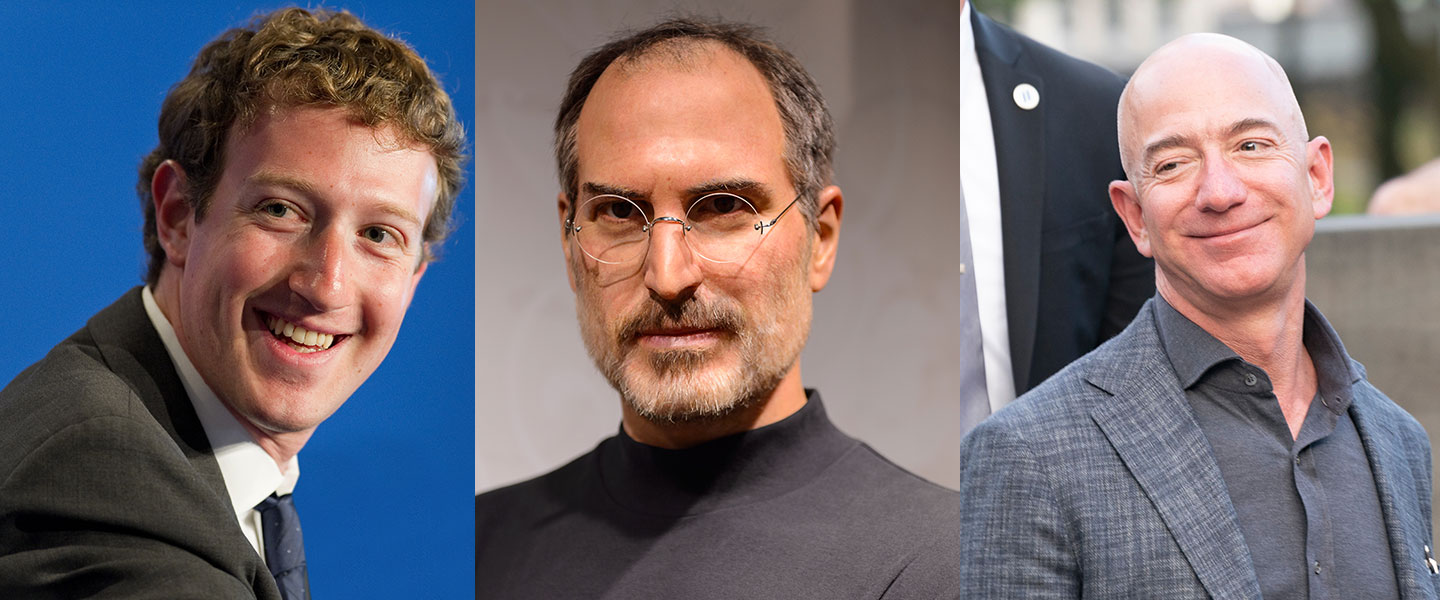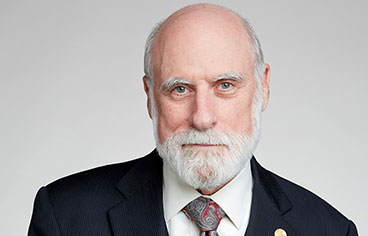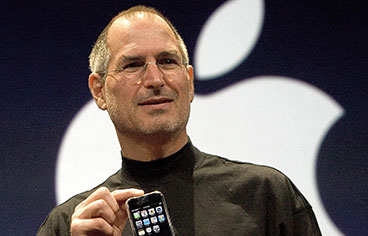
Lessons on Innovation from Digital Pioneers Like Mark Zuckerberg, Steve Jobs, & Jeff Bezos
Innovation can sometimes feel like climbing Mt. Everest, but finding a path up that mountain is easier when you learn from those who have already completed the journey.
Our digital world today was created by innovators who were able to conceive, execute, and popularize transformational ideas.
Here are ten valuable lessons you can learn from the people whose contributions laid the foundation for innovations such as the internet, social media, and modern ecommerce.

VINT CERF
Imaginative Exercises
Also known as the “Father of the Internet,” Cerf is one of the co-designers of the TCPI protocol, which is the underlying code for how messages are sent online.
In 2008, Cerf said “Imaginative exercises can have a profound impact on our future, what you can imagine can sometimes turn into something you can figure out how to build.”
A common problem we see when it comes to innovation is people struggling to voice an idea or allow themselves to imagine what they might do because they haven’t figured out how to actually accomplish it.
But many technologies and conveniences that we have today were envisioned and dramatized in science fiction shows such as “Star Trek” long before they were “invented”— doors that open automatically, the tricorder (which now seems like a primitive version of the iPhone), and voice recognition.
All of that started from people imagining what the future could look like without worrying about how to actually build it; their vision no doubt inspired inventors and engineers to figure out how it could be made real.

TIM BERNERS-LEE
The Future Is Bigger Than The Past
Considered the inventor of the world wide web, Lee was the developer of HTML, the underlying language used to build web pages.
As recently as 2009, almost 20 years after its invention, Berners-Lee said, “The web as I envisioned it, we have not seen it yet. The future is still so much bigger than the past.” Sometimes it can be frustrating to have a big idea but only be capable of bringing out a fraction of it.
This serves as a reminder that sometimes we aren’t able to bring forth the full extent of an idea as we imagined it initially, but it can act as a North Star that we move toward. Some big ideas take years or decades to fully mature, but they can still provide massive value in their nascent forms.

MARC ANDREESEN
Innovation Accelerates
Andreesen was the creator of Mosaic, the first popular web browser, and the co-founder of the pioneering internet company Netscape. Today, he is a well-known venture capitalist involved in many start-ups that have become big digital successes.
In 2018, Andreesen said of the speed of change, “Innovation accelerates and compounds, each point in front of you is bigger than anything that ever happened.”
As transformational as the personal computer was in the ‘80s and ‘90s, it's clear that the innovations of the subsequent decades in mobility and the web were far more profound. It's reasonable, based on Andreesen’s prediction, that we can expect the coming decade to dwarf this past one.

STEVE JOBS
Serving Humanity
Jobs was the founder of Apple and the main driving force behind the creation of the first modern smartphone, the iPhone.
In 1985, when talking about the culture at Apple, Jobs said “What is Apple after all? Apple is about... people who want to use computers to… change the world, to help them create things that make a difference.”
While many of the most innovative people today were financially successful, their primary motivation was often serving humanity, serving the world, and making a difference.
Companies with a greater purpose and a true mission are more effective as well as attractive, especially for Millennials and Gen Zs.
JEFF BEZOS
Complaining Isn’t a Strategy
Bezos founded Amazon in 1994, which has now diversified to become one of the most influential and well-known companies in the digital world. From the eBooks and Kindles which changed the publishing industry to the Alexa family of products, his company has revolutionized the way we shop and consume content. And Amazon Web Services, the SAAS platform Bezos created, is now one of the most important components of internet infrastructure in the world.
In 2013, Bezos said, “Lean into the future when the world changes around you, and when it changes against you, what used to be a tailwind is now a headwind. You have to lean into that and figure out what to do because complaining isn’t a strategy.”
Sometimes, difficulties can create your biggest opportunities. The COVID-19 pandemic created many problems for Amazon in terms of their operations, but their services were also so necessary when people were stuck at home that they had to find a way to make it work, and in fact, it grew their business substantially.
Companies today need to adapt and be agile to survive problematic situations.

JERRY YANG
Look Out for Users’ Interests
Yang is the co-founder of Yahoo!, one of the early pioneers in search engines and internet businesses.
Yang said, “We look at our users' interests. Without our users, we don’t have business.”
Thinking about your customers’ interests before your own isn’t the most common way to do business.
A lot of companies may claim to be thinking about their customers first, but don’t actually prioritize them behind closed doors.
But many of the companies who have been most successful in the digital age follow Yang’s advice and truly prioritize the needs of their customers—even when it costs them money.

LARRY PAGE
Don’t Miss the Future
Page is the co-founder of Google, one of the most influential companies in the digital world, and distributor of the Android, the #1 smartphone operating system.
In 2005, Page said, “Lots of companies don’t succeed over time. What do they fundamentally do wrong? They usually miss the future.”
A lot of companies put little thought into what the future will look like more than a few years out, which causes missed opportunities, whereas focusing on the future has enabled Page to grow Google into the success it is today.

MARK ZUCKERBERG
Move Quickly & Try a Lot of Things
Zuckerberg is the founder and CEO of Facebook, the world’s most popular social media platform with over 2.8 Billion users.
He said, “People think innovation is just having a good idea, but a lot of it is moving quickly and trying a lot of things.”
Many innovative efforts fail, and it’s difficult to sit in a conference room and predict for sure whether something is going to work.
However, there are many ways to test ideas out to determine how they will perform. For example, design thinking practices incorporate proven methodologies for identifying problems, coming up with possible solutions, testing them rapidly, and creating minimum viable products to get them to market quickly.
Don’t rely on the idea that you’re so smart that when you throw an “idea dart” it’ll hit the bullseye; instead, throw a lot of darts and identify which is closest to the bullseye, then move forward from there.
CHAD HURLEY
Small Details
Hurley was the creator of Youtube and sold it to Google for $1B.
He said, “It’s not about a big or revolutionary breakthrough where we discover this…thing that no one has ever seen before, it’s just about this small detail that’s been overlooked by everyone else.”
Often, the biggest differentiator isn’t completely reinventing something, but finding a slightly better way of doing something.
After all, is an Uber that different from a traditional taxi? Call it, it comes, it takes you somewhere, and you pay by the trip duration. It's the small details that make it much better—an easier way to request a car, a more streamlined method of communicating your destination and paying, etc.
But of course, the challenge is how we can identify the small details that will make a big difference.
Customer research gives us an opportunity to see those finer details, those user inconveniences that, if fixed, will unlock massive value.
Sometimes, something as simple as an easier-to-understand interface, a better way to search, or a more personalized experience can cause customer satisfaction and revenue to shoot up.

JACK MA
Passing on Concepts
Ma is the founder of Alibaba, one of the largest and most successful ecommerce operations in the world.
In 2012, he said, “It doesn’t matter if I failed, at least I passed the concept on to others, even if I don’t succeed, someone else will.”
Of course, Ma didn’t fail; Alibaba is enormously successful. But fear of failure holds back many potential innovators.
Ma’s mindset meant that even if he failed, the consequences would not be catastrophic because he would be passing something on to others. Ironically, this willingness to see the good in failure is what enabled him to avoid it.
Also, while all the innovators described above had massive successes, they all also had many failures. The lessons from those failures both informed their own future successes and served as guideposts for others who built upon their work.

GRACE HOPPER
It’s Only the Beginning
Let’s end with a bonus innovator that predated all of those listed so far.
Grace Hopper was the creator of one of the first major computer languages, Cobol, which ran on mainframe computers. Her work allowed many kinds of IT systems that predated the digital world we know today but were foundational to all the other innovations we’ve experienced these past decades.
In 1982, nearly 25 years after she invented Cobol, Hopper said, “We are only at the beginning…We’ve got the Model T, that’s where we are now.”
Things have come a long way since 1982, but the future is coming faster than we expect. Maybe what we’re seeing today is still just the Model T. If so, that means you’re in the perfect place to find opportunities to deliver value to your customers through innovation.